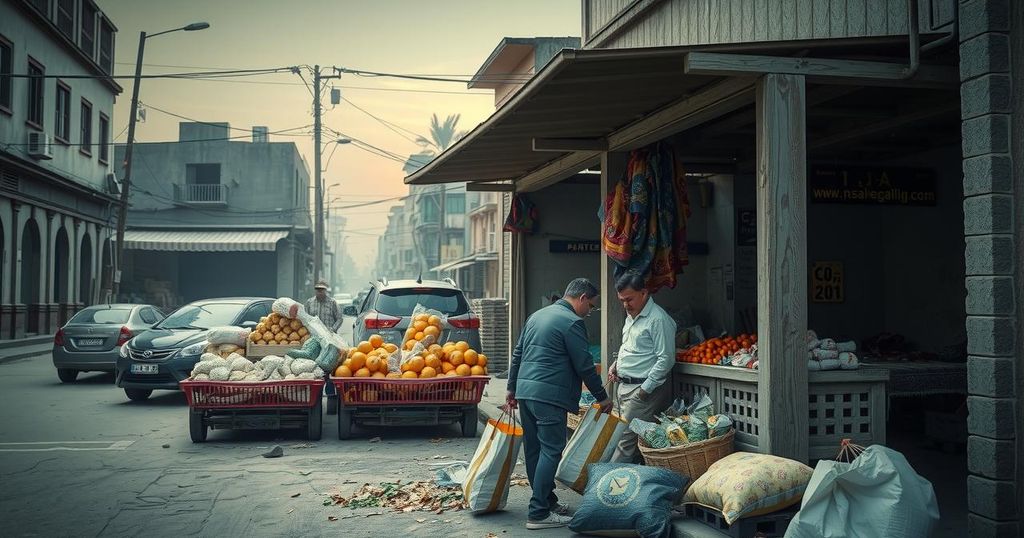Food prices in Goma, DRC, have surged dramatically following the M23 rebels’ takeover, with increases between 18% and 160%. ActionAid warns that this rise in costs could push hundreds of thousands into severe hunger, impacting families already struggling amid ongoing conflict. The situation highlights a humanitarian crisis exacerbated by blocked aid and disrupted supply lines, notably affecting women and children.
Following the recent takeover of Goma, the primary city in eastern Democratic Republic of the Congo (DRC), by M23 rebels, food prices have surged significantly. Locals report a staggering increase ranging from 18% to as much as 160% for essential food items, due to disrupted supply lines caused by ongoing conflict. ActionAid, an anti-poverty NGO, warns that this surge in costs could drive hundreds of thousands into severe food insecurity, making basic nutrition unattainable for many families.
Since the M23 takeover on January 26, residents have witnessed essential goods’ prices double, and in some cases, triple. Reported hikes in costs were documented across various markets in Goma, particularly affecting staples such as flour, beans, and cooking oil. Local comments highlight the dire economic situation, with Julienne Anifa, a mother of seven, stating that inflated prices are devastating households already struggling due to the war.
An anonymous community volunteer associated with ActionAid expressed the stark reality faced by families, where a bucket of rice that previously cost $20 now exceeds $23. Despite some reduction in food prices after the initial spike during the fighting, many struggle to afford even basic necessities. ActionAid is sounding the alarm about the potential for widespread malnutrition as incomes dwindle.
It is reported that over 90% of Goma’s food supplies are sourced from neighboring regions. However, the ongoing violence has severely restricted access, leading to both shortages and inflated prices. The negative effects of this hunger crisis disproportionately impact women and girls, increasing their vulnerability to exploitation and abuse. Prior to this escalation, nearly a quarter of the DRC’s population was already in urgent need of food assistance.
According to the World Food Programme (WFP), a staggering 4.5 million children under five and 3.7 million pregnant women face acute malnutrition risks in the aftermath of the conflict. The recent bouts of violence have compounded already critical conditions for displaced families reliant on humanitarian aid. Disruption to aid provision due to fighting has left many without essential support.
Yakubu Mohammed Saani, the country director for ActionAid in DRC, emphasized the need for immediate aid access, urging all parties to the conflict to ensure unhindered humanitarian operations. As of late Monday, M23 announced a ceasefire, claiming this decision was made for humanitarian considerations, yet many remain skeptical about the resumption of vital aid to the affected populations.
The ongoing conflict in the eastern Democratic Republic of the Congo (DRC) has led to a drastic deterioration in the humanitarian situation, particularly in Goma. The M23 rebels, supported by Rwanda, captured Goma on January 26, disrupting supply routes and increasing food prices dramatically. The escalating violence has already left millions in need of assistance, with many cities already facing substantial food insecurity prior to the conflict’s escalation. This backdrop sets the stage for the current crisis as families face unmanageable living costs and worsening nutritional health.
The M23 takeover of Goma has severely impacted food security, leading to unprecedented price hikes and threatening the livelihoods of local families. With over 90% of their food supplies disrupted and a large population already vulnerable, the situation continues to require urgent humanitarian intervention. Unless access to aid is secured, the risk of malnutrition and wider suffering will only increase in the affected regions of eastern DRC.
Original Source: www.aljazeera.com






